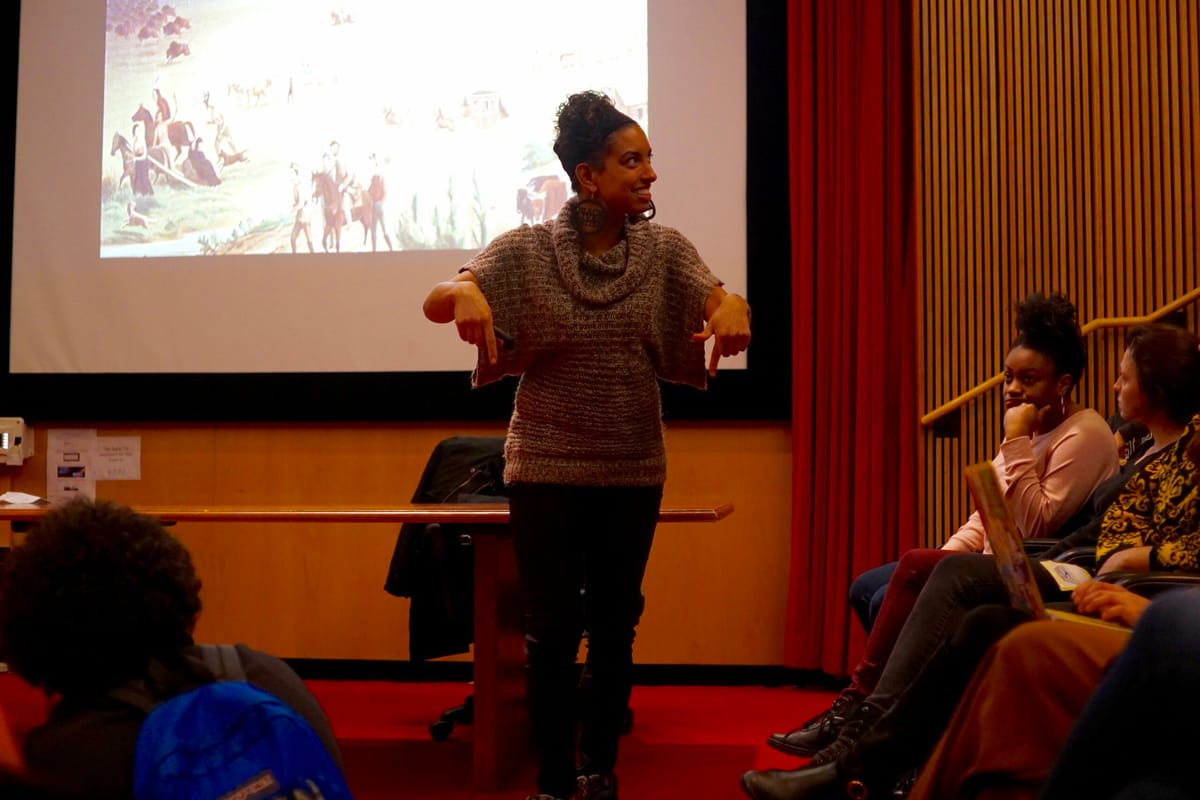Leah Penniman Gives Talk on Food Justice

Food justice activist and farmer Leah Penniman of Soul Fire Farm spoke on Thursday, Feb. 8 in Stirn Auditorium about the intersection of racial and environmental injustice and the food industry. The event was sponsored by the Office of Environmental Sustainability, the Victor S. Johnson Lectureship fund and the Multicultural Resource Center.
On Soul Fire Farm, located in Grafton, New York, Penniman manages a subsidized farm share program that provides fresh food to families that otherwise would not have access to it. Penniman also organizes training programs for black and Latino farmers, as well as an alternative program for local teens facing incarceration.
Penniman, whose Haitian ancestor helped start the Haitian revolution in 1791, began her talk by sharing the history of her ancestors and emphasizing the importance of ancestry in her work. “My family taught me that you never start going about talking about your work — or really doing anything — without acknowledging where you came from,” she said.
In her talk, Penniman emphasized the connection between the history of racism and land ownership, focusing on slavery and colonialism in the U.S. She described how Native Americans had their land stolen and were then used for slave labor. Slave labor from Africa was crucial to the American economy, Penniman said, because African slaves were especially skilled in farming and cultivating the land. The booming economy of the 1800s came as a result of torturous slave conditions, she said.
Penniman also noted that the connection between slavery and land ownership didn’t end with the abolition of slavery. Black codes, Jim Crow laws and sharecropping still tied African Americans to white landowners. “That stolen land and stolen labor continues,” she said.
Using this historical context to frame her talk, Penniman discussed why the work she does on Soul Fire Farm is important to social justice. “In this country, if you have brown or black skin, you’re only 25 percent as likely than if you have white skin to be near a supermarket that you can afford the food at,” Penniman said. “We need to talk about this food apartheid situation.”
She pointed to the environmental injustices Soul Fire seeks to combat. “Farming the way we’re doing it now is driving climate change, is driving mass extinction, is driving land conversions, is driving water withdrawals,” she said.
Soul Fire Farm’s mission is composed of “three stones.” The first stone in the mission is the farm’s survival program. A part of the program is “solidarity shares,” in which people can buy fresh food for neighbors that otherwise would not have access to it. Among the people who need food are refugees, immigrants and families whose relatives have been incarcerated.
“Feed the people and care for the land,” Penniman said of the first stone.
The second stone in Soul Fire’s mission consists of training programs for farmer activists. One of the main programs Penniman focuses on is Black-Latinx Farmers Immersion. The weeklong training program teaches young farmers of color the basics of agriculture and activism. Many of the program’s participants go on to take leadership roles on the farm, Penniman said.
The farm also runs a program called Project Growth, which serves as an alternative to juvenile incarceration. Rather than serving sentences, convicted youth have the opportunity to work on the farm. If the the farm workers’ grades are maintained, their criminal records are wiped clean. The program has served 14 young people.
The last stone is “movement building.” In this component of the mission, the farm extends support to other activist groups. One initiative the farm has implemented, Penniman said, is establishing a regional and national reparations network, which provides resources to farmers in need.
After presenting her work, Penniman opened the floor so the audience could brainstorm ways to solve food injustice before concluding with an excerpt from Toni Morrison’s “Song of Solomon”: “Grab this land! Take it, hold it, my brothers, make it, my brothers, shake it, squeeze it, turn it, twist it, beat it, kick it, kiss it, whip it, stomp it, dig it, plow it, seed it, reap it, rent it, buy it, sell it, own it, build it, multiply it, and pass it on.”
Lisa Zheutlin ’21, who attended the event, said that Penniman’s talk illuminated key issues while remaining optimistic. “The talk was so informative because she went through the history of discrimination in America and showed how that has translated into institutionalized racism in our food production system,” she said. “Even though these facts were disheartening, she showed that she was able to remain positive and combat these issues with her farm which was really inspiring.”





Comments ()